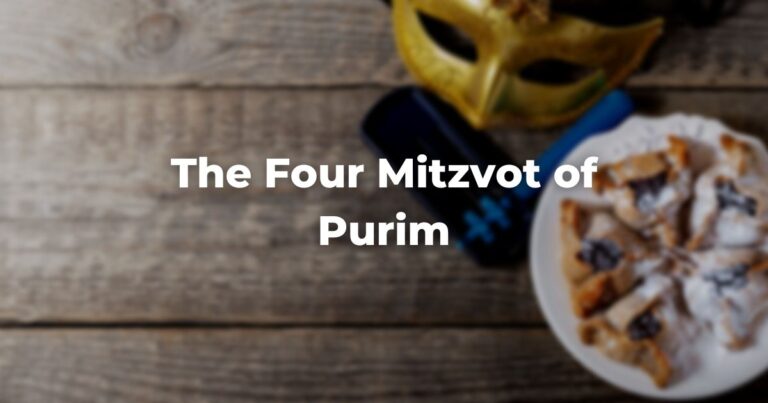Customary Food
It has become customary to celebrate Ḥanukkah by eating potato pancakes, commonly called by their Yiddish name, latkes, by Ashkenazic Jews.
In Israel, jelly doughnuts, called sufganiyot in Hebrew, are the more common holiday delicacy. What they have in common is that both are cooked in oil and so are able to evoke the miracle of the oil. Other Jewish communities also have special fried foods associated with Ḥanukkah for the same reason.
Another custom associated with Ḥanukkah is the four-sided spinning top called s’vivon (also spelled sevivon) in Hebrew, but more commonly referred to by its Yiddish name, dreidel.
Each side displays a Hebrew letter corresponding to the first letter of the words: nes gadol hayah sham (a great miracle happened there).
In Israel, the final letter is the first letter of the word poh (here) instead.
The sentence is just a made-up phrase, however; the real meaning of the letters has to do with the rules of the popular gambling game played with the dreidel, in which, depending on the letter one spins, one may win all or half the pot, or have to give some coins into it.
Although some rabbis have suggested the dreidel dates back to Ḥanukkah’s origins and was used as a ploy to distract the Greeks while the Jews studied Torah, Rabbi David Golinkin argues that the dreidel is based on a sixteenth-century game popular in England around Christmastime called totum. Our dreidel games are very similar to a German version of this game.
Gift Giving
The giving of gifts in the days and weeks around the winter solstice, when daylight is minimal and the weather is cold and unpleasant, is part of many cultures, especially those indigenous to temperate climates where the distinction between the seasons is the most pronounced.
The point is clear. Giving gifts is a sign of confidence in the future and in the eventual arrival of spring: one can afford to be generous with one’s stores since one clearly believes that they will soon be replenished.
Thus, gift-giving is connected in different cultures with winter festivals—with Ḥanukkah among Jews, but also with Saturnalia among the ancient Romans, Christmas among Christians, and Diwali among Hindus.
Traditionally, Jews gave children coins. Among Ashkenazic Jews, these coins were called by the Yiddish name of Ḥanukkah gelt.
In North America and Western Europe, this has mostly developed into more elaborate gift-giving, especially to children. While there is nothing wrong with making Ḥanukkah into a holiday that children associate with presents and thus anticipate all the more keenly, care should be taken not to allow that specific aspect of the holiday to overwhelm its spiritual character or to make its historical background seem to be of lesser importance.
In some circles, and especially in North America, the Christian festival of Christmas exercises a distinctly counterproductive influence on Ḥanukkah.
Indeed, when Jewish parents make the holiday into a parallel orgy of materialistic acquisitiveness, imagining just a bit pathetically that they are merely helping Ḥanukkah to “compete” successfully with Christmas for their children’s attention, they are merely bowdlerizing the meaning of the holiday, subverting its significance, and ruining its spiritual potential.
Sensitive Jewish parents will always try to resist unfair comparisons to the festivals of other religions, for no good can ever come from fostering the impression that Judaism is merely the Jewish version of Christianity (or any other faith, for that matter).
Ḥanukkah is not the Jewish Christmas any more than Passover is the Jewish Easter, and suggesting even obliquely to children that this is the case will at best confuse them. Moreover, doing so will set up a kind of competitive evaluative process that will inevitably denigrate the worth of both festivals and both faiths.
Adapted with permission from The Observant Life.
(Hanukkah has many spellings and is also spelled Chanukah or Hanuka.)
Authors
-

-

The Observant Life: The Wisdom of Conservative Judaism for Contemporary Jews distills a century of thoughtful inquiry into the most profound of all Jewish questions: how to suffuse life with timeless values, how to remain loyal to the covenant that binds the Jewish people and the God of Israel, and how to embrace the law while retaining an abiding sense of fidelity to one’s own moral path in life. Written in a multiplicity of voices inspired by a common vision, the authors of The Observant Life explain what it means in the ultimate sense to live a Jewish life, and to live it honestly, morally, and purposefully. The work is a comprehensive guide to life in the 21st Century. Chapters on Jewish rituals including prayer, holiday, life cycle events and Jewish ethics such as citizenship, slander, taxes, wills, the courts, the work place and so much more.
View all posts






